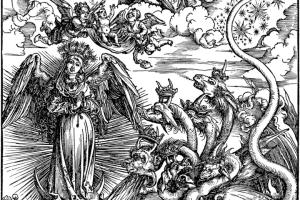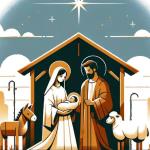As the year comes to an end, we are preparing to enter a bleak election year. Presidential candidates are already making noteworthy campaign promises to win the votes of the people.

- Save America
- Bring world peace
- Fight evil
With the new year approaching, we are hoping for better things ahead. A lower cost of living would help every person in the world as the world’s economies are struggling to deal with post-pandemic inflation.
It seems there is no end to the wars in the Middle East and the entire world is praying for peace in Israel. Both at home and abroad gun violence is out-of-control and governments are desperate for an answer to the senseless violence.
Only God knows what the future holds (Psalm 33:11, Jeremiah 29:11.) The problem is nobody knows what to do or what tomorrow holds because none of us are prophets.
Prophets
Most religions have some version of a prophet who talks with God. Christianity has had a problemsome relationship with the concept for 2000 years. The two main beliefs about prophecy are Cessationism and Continuationism.

The former belief is that there is no need for the gift of prophecy and it has ended and the latter is that God continues to call and talk to prophets. I’m not going to debate the subject of prophecy here but focus on what biblical prophecy is.
Historically and biblically God called prophets to lead and teach His people His will, biblical prophecy always concerns God’s will and purpose (Numbers 12:6, Deuteronomy 18:20.) God calls prophets to reveal His will.
Nāḇî’
Prophecy is important in Judaism because it began with the patriarch of the faith Abraham. The Hebrew word found in the Old Testament for profit is nāḇî’ and it means spokesperson or speaker.
The understanding is the prophet hears from and speaks for God alone. A prophet obeys God and leads God’s people to obey Him. Contrary to what many call modern prophecy, prophecy isn’t meant to encourage or make God’s people happy. The following are some of the major and minor prophets of Israel:
- Abraham
- Isaac
- Jacob
- Moses
- Aaron
- Joshua
- Pinchas
- Elkanah
- Eli
- Samuel
Jesus Himself fulfilled the role of prophet as He sought to do God’s will and to instruct God’s people. He even called Himself one (Mark 6:3-4.) Jesus proclaimed God’s will, not the people’s will.

False prophets focus on making people happy. Israel has had its share of false prophets from the beginning (Jeremiah 23:14.) Jesus warned His followers about the rise of false prophets and false messiahs in the last days (Matthew 24:24.)
False Messiahs
We have been living in the last days ever since Jesus rose from the grave and ascended to heaven. That is why Jesus warned the Bride to be ready for His return (Luke 12:40; 17: 26-30; 21:25-27.)
Like a faithful bride, God’s people must stay faithful to her husband by not being tempted and led astray by false messiahs who promise us the world and save us from its trials.

Only the bridegroom can save us because only He knows the future. As the new year is approaching, we must prepare while we wait. While we wait our faith will be tested, Jesus warned the early church about the trials and tribulations that lie ahead for God’s people (Matthew 24:9-10.)
False messiahs and prophets deceive God’s people by telling them what they want to hear. They make false promises to save God’s people from hardships. These deceivers focus on temporary things instead of eternal things.
- Earthly greatness
- Wealth
- Earthly power
Judaism and Christianity both teach that this world is temporary. The physical will not last. Evil be vanquished for eternity. God’s kingdom is coming and will last forever, these are the focus and goals of a true nāḇî’!













